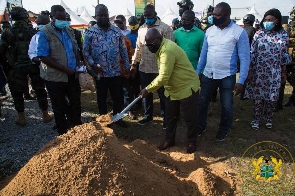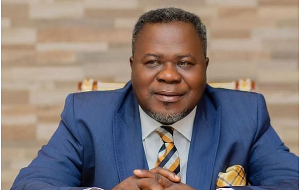General News of Tuesday, 9 September 2003
Source: GNA
Don appeals to govt to solve polytechnics' problems
Sunyani, Sept 9, GNA - Dr. Kwasi Nsiah-Gyabaah, Principal of Sunyani Polytechnic, on Monday appealed to the government to address problems confronting polytechnics urgently for a lasting peace on their campuses. He said strikes and demonstrations by students and the Polytechnic Teachers Association of Ghana (POTAG) for improved conditions of services disturb the peace on polytechnic campuses.
The Principal made the appeal at the opening of the 26th annual delegates congress of the Ghana National Union of Polytechnic Students (GNUPS) in Sunyani.
Dr Nsiah-Gyabaah said inadequate funding resulting in lack of physical and academic facilities, misconception about the roles of polytechnics in national development, lack of recognition of HND certificates and job replacement are some of the challenges facing polytechnic education.
Dr Nsiah-Gyabaah expressed regret that the polytechnics have not gained much recognition in spite of the important role they play in the provision of middle level manpower needed for the nation's socio-economic development.
Lack of information, inadequate understanding of programmes offered in the polytechnics and students' approach to issues that affect them have contributed to the poor image of the polytechnics, he said. Dr Nsiah-Gyabaah appealed to the government to ensure equal conditions of services for both universities and the polytechnics "since poor conditions in the polytechnics do not attract qualified staff, whilst some leave immediately they are offered appointments."
He said to address the apparent confusion between universities and polytechnics the syllabus for senior secondary schools be reviewed so that courses would be designed and designated SSSCE-Technical and SSS-General.
Those who opt for SSSCE-Technical should be admitted to pursue polytechnic education and those who choose the SSS-General should also be admitted to the universities, Dr Nsiah-Gyabaah added. Mr Joe Donkor, Deputy Minister of Education, Youth and Sports, advised the students to exercise restraint and give the government chance in finding lasting solutions to the numerous problems facing the polytechnics.
He said the government is doing its best to facilitate the success of youth education in the country, adding that about 2.7 trillion cedis of the annual budget goes into education, representing a higher percentage than health and agriculture.
The Deputy Minister said the future of the nation depends on the youth and government would not relent on its efforts to ensure that every youth received skills and vocational training to develop their potentials towards national development.
Mr Issah Mohammed Ikilil, the National President of the union, urged the government "to review its attitude towards tertiary education as a whole and polytechnic education in particular since no effort has been made to improve conditions of services."
"Tens of thousands of polytechnic graduates are in the outside world confused and thousands will soon join them frustrated, as no meaningful avenues have been opened for them to pursue higher education and on the job market as public sector establishments do not know where to place the HND graduates."
Mr Ikilil described as unfortunate a statement allegedly made by a minister that government could no longer fund tertiary education and called on the government to appreciate the benefits the nation gains from tertiary education.
He said it would make a mockery of Ghanaians if students are allowed to shoulder the full cost of their education "under the current unbearable economic circumstances, while some people contemplate state funding of political parties."










